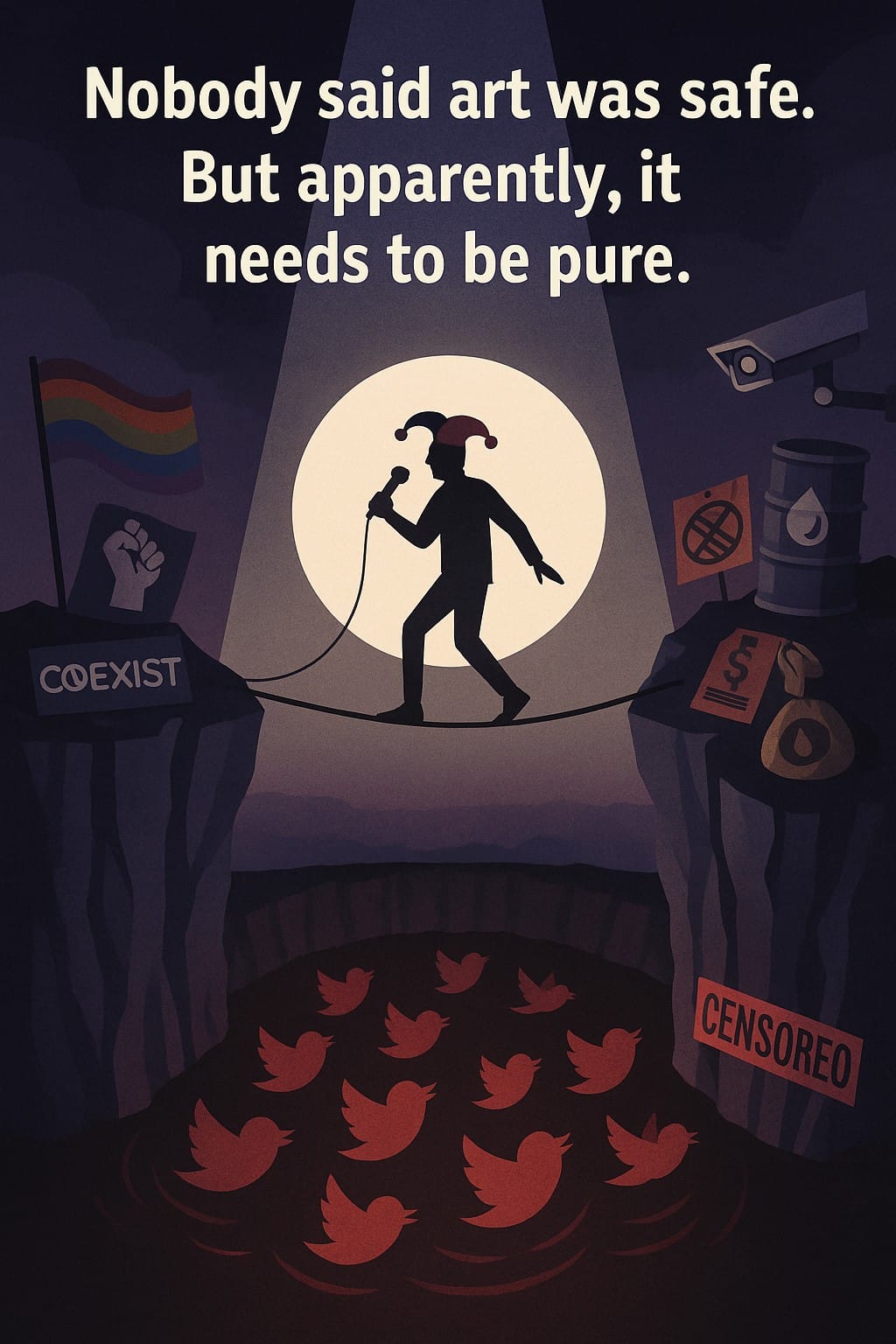Bill Burr told jokes in Riyadh. A week later, the internet wasn’t laughing.
Bill Burr, a man who built his career yelling truths at uncomfortable audiences, walks onto a stage in Riyadh. The venue is pristine. The sound system is crisp. The country’s human rights record is… let’s call it “developing.”
The country isn’t exactly a bastion of free speech — it’s a place where journalists are murdered for it (see: Jamal Khashoggi, dismembered in a consulate in 2018, a story that briefly made everyone care about press freedom before we all went back to arguing about Netflix shows).
A week later, Twitter—sorry, X—erupted like a moral Vesuvius, burying Burr under layers of hot takes and cold shoulders.
For many progressives who have spent two decades watching Burr skewer hypocrisy, cancel culture, and authoritarian thinking, this felt like betrayal. Some fans called it blood money. Others said Burr had finally sold out. A few suggested the show was part of Saudi Arabia’s global PR campaign to whitewash its reputation — sportswashing, but make it comedy.
The common theme? Outrage. Lifelong fans declared they were done. Ten, twenty years of comedy genius — erased in a single night.
And yet, the fury says as much about us as it does about him.
The Left’s Black Sheep Reflex
Progressives are quick to turn on their own because our politics are built on principle, not loyalty. Social psychologists even have a name for it — the Black Sheep Effect.
It was first documented in 1988 by José Marques, studying French college students, because, of course, the French would formalize the art of turning on your own people. The finding? Groups don’t just punish deviant members; they punish them more harshly than outsiders who commit the same offence. It’s not enough to disagree with us — you had to pretend to be one of us first.
And here’s the kicker (you knew there was a kicker): research from the University of Southern California found that liberals are more likely to ostracize ingroup members for moral violations than conservatives are — by a factor of nearly 2 to 1. We’ve literally weaponized our principles into a tool for social exile.
Congratulations, us.
For liberals and left-leaning folks, morality is rooted in harm, fairness, and justice. So, when one of our own violates those principles — even symbolically — we react as though the entire movement’s credibility is on the line. A progressive breaking moral code isn’t just a mistake; it’s a betrayal of the cause.
And betrayals are unforgivable — especially when they come from someone who once made us feel seen.
That’s why someone like Bill Burr performing in a censorship capital triggers such a visceral response. We expect the right to flirt with hypocrisy; it’s practically part of their platform. But we hold “our people” to higher standards — often impossibly high ones.
The right circles the wagons. Meanwhile, we’re out here playing circular firing squad — which, if you think about it, is just a really inefficient way to prove you care about gun control.
The Right’s Shield of Loyalty
While progressives are torching their clowns for hypocrisy, conservatives are busy baptizing their sinners.
Look at the ongoing Epstein client list fiasco.
For years, right-wing voices demanded the names be released — until it became clear Donald Trump’s fingerprints (among other parts) are probably all over them. According to a YouGov poll from 2023, 76% of Republicans wanted the client list released — until court documents started dropping Trump’s name 73 times in January 2024.
Suddenly, conservative media pivoted to “well, being on a flight log doesn’t mean anything” faster than you can say “conspiracy theory.”
The appetite for truth dried up faster than a Fox anchor’s credibility. Give it a week, and they’ll blame the Deep State for the flight logs, too.
Or take the new wave of “freedom lovers” cheering on ICE detaining Americans without due process. These are the same people who claim government overreach is tyranny — unless it’s directed at someone with the wrong skin tone or accent.
When loyalty is the highest moral value, anything your side does is justified. When purity is the highest moral value, anything your side does wrong is unforgivable.
The right has chosen the former, the left the latter.
Guess which one survives longer in politics?

The Cost of Purity
The left’s moral consistency is our strength — and our Achilles’ heel.
We demand accountability, we care about integrity, and we want our public figures to live their values. But we’ve turned moral consistency into an Olympic sport.
Every artist, ally, or activist who stumbles becomes an excommunication ceremony. We don’t just critique — we delete. We erase. We “cancel” in the truest sense of the word: remove from the record.[^1]
Meanwhile, the right embraces its fallen heroes. They’ll defend a twice-impeached insurrectionist, a preacher who cheats on his congregation, or a policy that violates their own stated values — because team comes first.
We, on the other hand, eat our own for dessert. The feast is righteous; the stomachache is permanent.
And if we keep doing it, we’ll have the cleanest consciences in the gulag — which, let’s be honest, is probably the only place where “I was morally consistent” will count as currency.
A Case for Forgiving the Clowns
Back to Burr. Maybe he took the money. Perhaps he wanted to see what comedy looks like under censorship. Maybe he thought, Hey, if I can make Saudis laugh about marriage, that’s progress.
Comedy in authoritarian regimes has a weird history of creating cracks in the armour. Soviet-era Russians had entire networks of underground jokes that kept dissent alive. Maybe Burr thought he could plant a seed. Perhaps he just wanted the paycheck. Both can be true. Humans contain multitudes — and most of those multitudes are broke.
None of those explanations absolves him — but they don’t justify erasing him either. Burr’s not a dictator; he’s a comedian. His weapon is irony, not ideology. If we can’t tolerate even our own jesters wandering into moral gray zones, then who’s left to make us laugh at the darkness?
We overlook that moral progress relies on the messy middle — on the imperfect, inconsistent, sometimes hypocritical humans who challenge norms, stumble, and occasionally learn. When we demand ideological purity, we don’t just silence bad actors. We scare good ones into silence.
I’ve done it too.
We all have that moment of moral superiority that feels so good, we forget it fixes nothing.
Progress requires elasticity. It needs people who can test lines, cross them, and come back with something to say. If the price of stepping out of bounds is permanent exile, we’ll end up with a culture full of timid saints and no prophets.

Forgiveness as a Radical Value
The right shields its tribe out of loyalty. The left should protect its artists out of love — love of truth, love of nuance, love of the human condition that makes progress possible.
Forgiveness isn’t moral weakness; it’s the strength to stay in the conversation. It’s a refusal to trade curiosity for condemnation.
Bill Burr may not have delivered the most principled set of his career in Riyadh. But maybe, just maybe, he reminded us that freedom of expression — the messy, awkward, imperfect kind — is still worth defending, even when it happens in the wrong place, at the wrong time, in the wrong way.
Because here’s the uncomfortable truth: the right wins elections while defending the indefensible.
The left loses them while demanding perfection.
And if we can’t figure out the difference between accountability and annihilation, we’ll keep losing — morally correct, politically irrelevant, and very, very alone.
Because if we can’t forgive our clowns, we’ll end up with nothing but jesters who never take risks — and a right wing that never pays for its sins.
And between the humourless and the shameless, I’ll take the clowns.
We need fewer purity tests and more honest conversations — even when they make us uncomfortable.
[^1]: Ironically, the same crowd that claims to hate George Orwell’s 1984 has become extremely efficient at memory-holing people. We’ve basically invented thoughtcrime — but with better branding.


